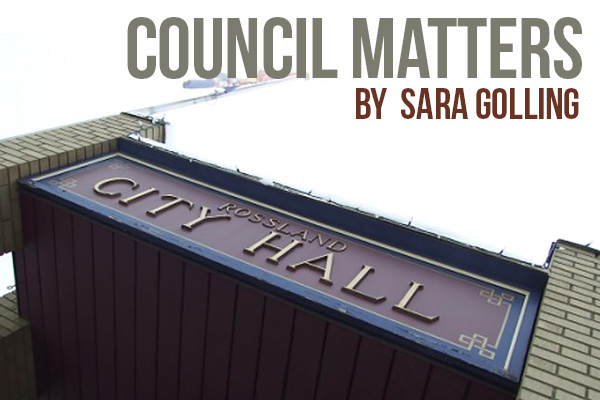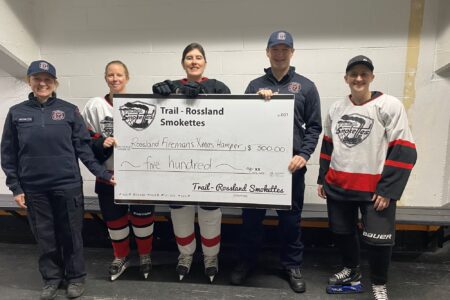One Heroic Rosslander; Logging at Redstone? -- and a Fat Bike Race!
As time eats into the New Year, our new Council chews on some tough issues.
Rossland City Council Regular Meeting
January 12, 2015
Present: Mayor Kathy Moore, Councillors Lloyd McLellan, John Greene, Andrew Zwicker, Marten Kruysse, Andy Morel, Aaron Cosbey.
Staff: Deputy Chief Administrative Officer Tracey Butler, Executive Assistant Cynthia Añonuevo, Planner Stacey Lightbourne, Acting Chief Financial Officer Lois Hunter, Manager of Public Works Darrin Albo
Public Input Period: Mark Impey spoke about his application for a variance on a development permit at 1936 Queen St. He has a building permit to put in a suite and has a tenant lined up; he is applying for a variance to change the parking requirement from two spaces to none. There is no off-street parking on the property, and Impey pointed out that the people living in the house, including the tenant, don’t own vehicles.
Larry Doell addressed Council about a belated letter asking for approval for an event on the outdoor rink at 3rd & Spokane during Winter Carnival. Laura Price of the Greater Trail Minor Hockey Association suggested the event, with short games between 3-player teams consisting of people from 4 to 16 years old. Albo said the only additional cost involved would be that staff might need to clean the ice and perhaps re-flood it during the event. Council added this item to the agenda.
Delegation: The Heritage Commission
Jackie Drysdale, Chair of the Heritage Commission (“HC”), addressed Council . She clarified the distinction between “heritage” and “history” — in the context of the HC, “heritage” refers to buildings and sites. One of the HC’s tasks is to identify heritage buildings and sites; currently there are 19 buildings and 13 sites registered. She mentioned several examples, explaining that the OK store (built in 1896) is on the register because it is representative of the small hotels that were built in Rossland’s heyday — not for its condition or even its age. She spoke of the orchard in Happy Valley which is a Heritage Site because it was an experimental farm in the early days, to investigate apple-growing at this elevation. The HC was created in 2009, and receives about $5000 per year from the City.
McLellan asked how closely the HC works with the Design Review Panel (“DRP”). Drysdale responded that so far, they haven’t, but are looking forward to it. Moore commented that the HC mandate could be updated to included working with the DRP, and McLellan commented that it could be reciprocal — the mandate of DRP also include working with the HC. Kruysse thanked Drysdale for her presentation, and suggested that Rossland’s heritage makes our offering for visitors different from other places, and its authenticity is valuable.
Council recessed to Committee-of-the-Whole (a less formal mode, for discussion).
Council discussed a draft “Issues List”, drawn up from a “brain dump” of ideas from Council members. The topics included: governance, “council administrative”, financial viability, business and revenue development, operating environment, competitive environment, services (e.g., roads, water, sewer, plowing, etc.) community economic development, council responsiveness to new issues, pricing (Rossland’s taxes, fees and charges), City-owned buildings and land, human resources, communication & accountability, and financial management.
Council noted that there was some overlap among the issues listed. Kruysse suggested that Council should address those issues over which they have control. McLellan wanted to look at issues that need to be handled as soon as possible, and named several, including “resolving the CAO issue” and the recreation issue. Moore commented that some of the “issues” listed are already underway, as Council and staff are in the process of addressing recommendations from the Auditor General for Local Government.
Butler suggested that a “mini-strategic planning session” at a separate time might be easier than discussing the list in Council. Cosbey liked the idea, and said it should have a facilitator other than Butler, as staff input is important. McLellan indicated that an initial identification of some action items before getting into strategic planning would be a good thing to do with an on-line survey tool. Cosbey added that he thought they wanted to get a list of things that are really important, so as to give some direction to staff. McLellan said that the real driver is the need to work on the budget.
Council agreed to accept the issues list, and to work on refining and prioritizing it at a later session.
Budget Presentation by Acting Chief Financial Officer Lois Hunter:
Hunter presented a draft budget with some assumptions that will not be finalized unless and until Council incorporates them into the actual budget when it is finally settled. This presentation was to further Councillors’ understanding of the City’s financial situation and the financial documents.
She reiterated how Rossland got to our current state of infrastructure deficit: long ago there was extensive infrastructure construction with long life-spans, without any budget provision made for their eventual replacement; now the bulk of it is at the end of its life, with increased maintenance costs and growing risks of failure, and very little money set aside for replacement.
Hunter closed her presentation with a quick summary of how to structure a long-term financial plan to address the shortfall, taking inflation into account.
Council moved out of Committee-of-the-Whole and re-convened the regular Council meeting.
Recommendations from staff for Council decision:
(a) Motion: THAT Council approves the Development Permit Variance application to waive the number of parking spaces required by City of Rossland bylaw No. 2518 from two to zero spaces, for 1936 Queen Street. Cosbey noted that there is ample parking across the street from this home, and said his default position is to think that staff have got it right. Kruysse asked a question which clarified that the variance will be registered on title and be permanent. McLellan stated that he had looked at the property and thought there was room for at least one parking spot on the property, if a set of stairs could be moved. Zwicker asked about the precedent-setting aspect, and whether an exception should be made for properties right downtown; Moore explained that if we make an exception, we have to be able to justify it. Cosbey said that if another case came along with the same characteristics, he would make the same decision. Motion carried, with McLellan opposed.
(b) THAT Council approves the Development Permit Application for eleven parcels at Redstone Golf Course, covering about 300 acres, for “land alteration” including thinning of trees, selective logging, removal of hazard trees, and mine remediation — subject to various conditions to preserve habitat, water quality, and other environmental concerns. Kruysse spoke in support of the motion. Cosbey noted that the application satisfies the requirements and in that case, Council is bound to approve it. Morel asked about the City’s duty of oversight; he noted that the person suggested for the oversight function (the monitor) does not appear to be as fully qualified as might be optimal. Moore noted that some of the things required in the original consultant’s report were not included in the monitor’s letter. Lightbourne said that she did clarify the City’s expectations and requirements with the monitor and that she has agreed in writing to do those additional tasks. Moore raised the issue of the trails — that Redstone had committed to dedicating some trails to the City, but some of that has not been done; Lui Joe is protected, but Rubberhead is not. Lightbourne explained that the development permit criteria are environmental in nature, so the trail issue is irrelevant and cannot be used. Morel asked if the Ministry of Environment could review the project . Motion carried, with Morel opposed.
The City had received a letter from an individual asking for more lighting at the outdoor ice rink, and an electrical outlet. Cosbey moved that a light be installed, but not an outlet; he thought it is reasonable to have a light there. Greene said he wasn’t in favour because he thinks there is already enough light there. Zwicker said he thinks of it as similar to a natural pond, not a “full service arena” and that he has used it a lot and finds the lighting adequate; McLellan agreed. Kruysse agreed that it should be for daytime use, but Cosbey noted that it gets dark at 4:00 pm. Moore said she doesn’t know what the usage numbers are; she’d be more supportive of it if more than one person asked for it. The motion failed, and Butler said she could suggest to the person who wrote the letter that people do some fundraising and show broader support, and then come back to Council.
Trail Council submitted a letter asking for Rossland Council’s support for their application for funding to build a second access road for the Trail hospital. The motion in support carried unanimously.
Council discussed the request for use of the outdoor ice rink for the “three on three” event during Winter Carnival, that Larry Doell had introduced during Public Input Period. Greene noted that the bobsled race will be going right by there at that time, so they should use a safer access. Albo said there’d be a maximum cost to the City of about $100. The motion to permit the use carried unanimously.
Correspondence Consent Calendar: Information Items. (Recommendations in this list of items are approved automatically unless Council members wish to “pull” them for questions or discussion and possibly a different decision, first)
Cosbey wondered why the Rossland Council for Arts and Culture spent only part of their budget on the Miners Hall project. Butler explained that planning is taking longer than expected.
Zwicker spoke about the Sustainability Commission’s planning event at Seven Summits School on January 28.
Moore spoke about Rossland’s failure to obtain any “age-friendly” grants, while Fruitvale has done a great job and obtained a grant. Moore asked for other Council members interested in getting together to work up an application for next time. Cosbey, Morel and Zwicker volunteered.
Moore commented on the request from Tyler Merringer of “Revolution Cycles” to hold “Fat Bike Race” in conjunction with Winter Carnival, saying she thought it was “a great idea”. The staff recommendation was to approve the request, so the Fat Bike Race is on.
The Council Procedure Bylaw came before Council for third reading, but that didn’t happen. Instead, McLellan moved to have a small committee review it and come back with recommendations for amendments. Cosbey asked what would happen if the committee recommends changes; Butler responded that it would go back to second reading. McLellan’s motion carried unanimously. McLellan, Moore, and Morel volunteered to review the draft bylaw.
Member Reports:
Third Party Disclosure, and Disclosure of Related Parties and Related Party Transactions: All Council members will be completing these forms in January every year. Council discussed what needs to be included, with the conclusion that it is better to err on the side of including too much information rather than not enough. All staff are completing the forms, and all contractors working for the City will be completing them too.
Cosbey spoke about the Broadband Task Force. He has met with all parties, and the Task Force concludes that it is still not clear whether there is a business case for broadband in Rossland, and there are questions about the ownership of the infrastructure. They have agreed that we need a consultant’s help, and they have let CBBC know that “we are very interested in proceeding.” Cosbey moved that Rossland allow for the hiring of a consultant to assess the business case for broadband in Rossland, and the associated economic benefits and costs. McLellan wanted an assessment, and suggested that the expenditure be limited to $5000. Cosbey likes the idea of a cap, but isn’t sure $5000 is the right number’ given that CBBC had appraised the job at $15,000 plus $5000 — there was another motion to amend the cap to $10,000, and that amendment carried.
The original motion to hire a consultant, with the amended funding cap of $10,000, carried unanimously.
McLellan suggested that Council invite school trustee Gordon Smith to address Council, and that it could be a regular event, every three months or so. Moore agreed that staff could send an invitation to Smith to appear as a delegation.
Moore reported on her attendance at several meetings and events, including a breakfast meeting with Neil Muth of CBT, and a meeting of the Communication Committee with Thought Exchange discussing possibilities for the City to obtain citizen input on the financial plan and other issues.
A motion to begin Council’s next regular meeting on January 26 at 6:00 PM carried unanimously.
Butler updated Council on potentially hiring a grant-writer; staff have explored several avenues but have not had any success. Council discussed at some length various ways of addressing the grant-application challenge in hopes of obtaining funds for a large infrastructure project on Washington Street.
Greene suggested that the City recognize and thank Rossland resident Patrice Gordon, a nurse practitioner with the Red Cross in Africa, for her courageous work with Ebola patients in Sierra Leone. A letter will be forthcoming.
Moore adjourned the public portion of the meeting and moved to an in camera session, for discussion of litigation and labour relations. And your reporter crunched home on the ice and gravel, wishing (as usual in the winter) for more snow, and contemplating the enormous role that volunteers have played in building Rossland since the City’s very early days.
























